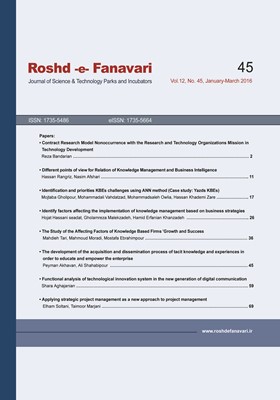Identify Factors Affecting the Implementation of Knowledge Management Based on Business Strategies
Subject Areas : مديريت تکنولوژيHojat Hassani seadat 1 , Hamid Erfanian Khanzadeh 2 , Gholamreza Malekzadeh 3
1 -
2 -
3 -
Keywords: Effective Factors Implementation Knowledge Knowledge Management Business Strategies,
Abstract :
Knowledge is a valuable resource and strategic factor and also an asset. So providing good and qualified products and services without management and use of this valuable resource, is difficult and sometimes impossible. Knowledge management has become one of the most important activities in today's organizations to improve and maintain competitive advantage. The ultimate goal of knowledge management is the operation and development of knowledge assets to achieve the goals and create added value for the organization. It is obvious that knowledge management is crucial in the formulation of business strategy for gaining competitive advantage. Therefore identifying factors affecting the implementation of knowledge management based on business strategy is very important. In this study, 55 factors affecting the implementation of knowledge management extracted. Then by using Delphi method and the adoption of experts opinion, their relationships with business strategies were identified. On this basis, 35 factors in 6 dimensions were identified: Leadership, Strategic, Infrastructure, Structure, Cultural and Scientific Dimension. Among the identified dimensions, leadership dimension was more important than the other dimensions. Strategic and Scientific dimensions are the next one and 64 percent of the identified factors were confirmed.
1- شعباني، احمد. حامد فروگذار. و مرتضي محمدي استاني. شناسايي، بررسي و رتبهبندي عوامل مؤثر بر پيادهسازي مديريت دانش با استفاده از تكنيك TOPSIS (مطالعه موردي: دانشگاه علوم پزشكي شيراز). دو ماهنامه مديريت اطلاعات سلامت، پزشكي، پيراپزشكي داراي رتبه علمي پژوهشي (پزشکي). سال نهم، شماره 3. 1391.#
2- حیات داوودی، میثم. و رضا برادران کاظمزاده. ارائه چارچوب جامع و ابزار ارزیابی سطح بلوغ مدیریت دانش در محیطهای دانشگاهی و تحقیقاتی با الهام از استانداردهای CMMI و ITIL. ششمین کنفرانس مدیریت دانش. تهران. 1392.#
3- مؤمنی، سیدمیثم. تدوین و ارائه یک چارچوب بویم برای پیادهسازی جامع رویکرد مدیریت دانش در سازمان. مطالعه موردی صنایع کشتیسازی. پایاننامه کارشناسیارشد. دانشکده ادبیات و علوم انسانی. دانشگاه گیلان. 1390.#
4- ابراهیمیان جلودار، سیدیاسر. سیدروحاله ابراهیمیان جلودار. و سیدمحمود ابراهیمیان جلودار. بررسی اثربخشی مدیریت دانش (با مروری بر توانمندیها و فرایند مدیریت دانش). فصلنامه علمی ترویجی توسعه سازمانی پلیس، دوره نهم، شماره 41. 1391.#
5- مانیان، امیر. و [دیگران]. طراحی مدل بلوغ مدیریت دانش همراستا با استراتژی کسب و کار با استفاده از روش فراترکیب. مدیریت فناوری اطلاعات، دوره ششم، شماره 2. 1393.#
6- اکبری، مهدی. و محمود مرادی. ارائه یک سیستم پشتیبان تصمیم فازی به منظور سنجش آمادگی سازمان جهت پذیرش مدیریت دانش. فصلنامه مدیریت توسعه فناوری، شماره 1. 1392.#
7- ملکزاده، غلامرضا. و مصطفی کاظمی. و محمد لگزیان. هوش سازمانی: طراحی مدل سلسله مراتبی برای دانشگاههای دولتی ایران با رویکرد دیماتل. پژوهشنامه مدیریت تحول، دوره پنجم، شماره 10. 1392.#
8- Lotti Oliva, F. Knowledge management barriers, practices and maturity model. Journal of Knowledge Management, 18(6): 1053-1074. 2014.#
9- Serenko, A., Bontis, N. & Hull, EAn application of the knowledge management maturity model: the case of credit unions. Knowledge Management Research & Practice. 2015.#
10- Migdadi M. Knowledge management enablers and outcomes in the small-andmedium sized enterprises. Industrial Management & Data Systems 109(6), 840-858, 2009.#
11- Lin, C., Wu, J. C. & Yen, D. C. Exploring barriers to knowledge flow at different knowledge management maturity stages. Information &Management, 49(1): 10-23. 2012.#
12- Lopez, S., P. Montes, M. Jose, O. Vazkquez & J. Camilo. In Information Technology as an Enabler of Knowledge Management: An Empirical Analysis. W. R. King (ed.). Knowledge Management and Organizational Learning. Annals of Information Systems. 4. Pp. 111-129. 2009. #
13- Serna, E. Maturity model of Knowledge Management in the interpretativist perspective. International Journal of Information Management, 32(4): 365-371. 2012.#
14- O'Dell, C. and C. Hubert. The new edge in knowledge: How knowledge management is changing the way we do business. New York, usa: Wiley. 2011.#
15- Chen, Y. and Huang, H. Knowledge management fit and its implications for business performance: A profile deviation analysis. Knowledge-Based Systems, 27(9): 262-270. 2012.#
16- Ale, M., Toledo, C., Chiotti, O., Galli, M. A conceptual model and technological support for organizational knowledge management. Science of Computer Programming, 95(1): 73-92. 2014.#
17- Moqbel, M., Nevo, S. & Kock, N. Organizational members’ use of social networking sites and job performance. Information Technology &People, 26 (3): 240 – 264. 2013.#
18- Ogiela, L. Advanced techniques for knowledge management and access tostrategic information. International Journal of Information Management, 35(2): 154–159. 2015.#
19- Dorasamy, M., Raman, M. & Kaliannan, M. Knowledge management systems in support of disasters management: A two decade review .Technological Forecasting and Social Change, 80(9): 1834-1853. 2013.#
20- Kuriakose, K. K., Raj, B., Satya Murty, S. A. V. & Swaminathan, P. Knowledge management maturity model: an engineering approach. Journal of Knowledge Management Practice, 12(2): 1-17. 2011.#
21- Pee, L. G. & Kankanhalli, A. A model of organisational knowledge management maturity based on people, process, and technology. Journal of Information & Knowledge Management, 8(02): 79-99. 2009.#
22- Moriwaki, N., Nomura, K. I. & Senoo, D. A behavior-based approach for analyzing knowledge-process dynamics. Journal of service science and management, 6(2): 160-169. 2013.#
23- Anantatmula V., S. Kanungo. Modeling Enablers for successful KM implementation. Journal of Knowledge Management. 14 (1). pp. 100-113. 2010. #
24- King, W.R. & Marks Jr, P.V. Motivating knowledge sharing through a knowledge management system. Omega, 36(1): 131-146. 2008.#
25- Xu, J., Quaddus, M. Examining a model of knowledge management systems adoption and diffusion: A Partial Least Square approach, Knowledge-Based Systems, 27: 18–28. 2012.#
26- Turoff M, Linstone HA. The Delphi method: techniques and applications. 2008.#

